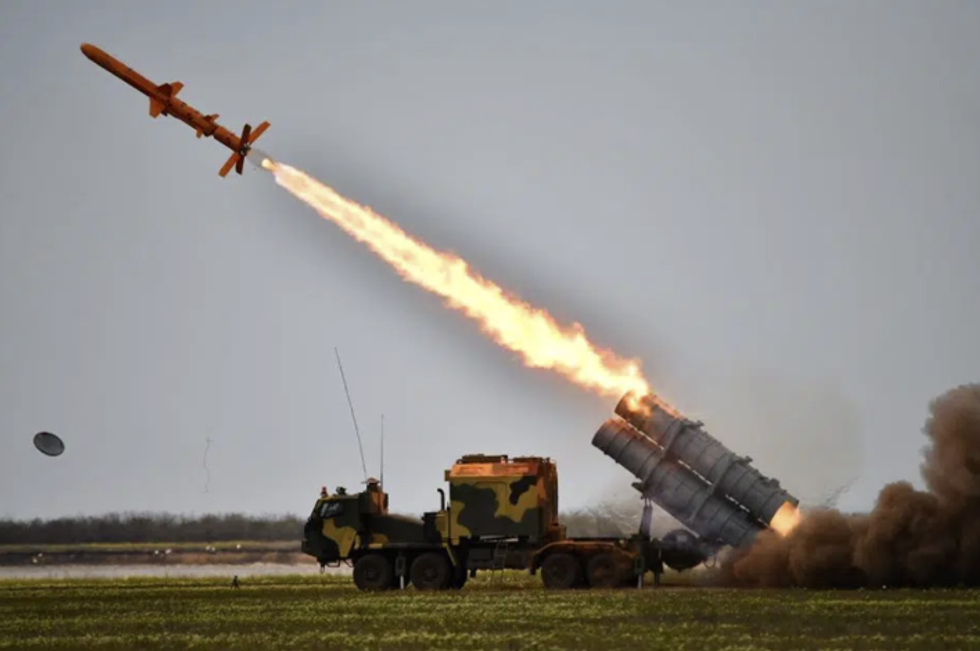
Ministry of Defense of the Russian Federation

Russia suffered a major loss on Thursday after Ukrainian Neptune missiles reportedly destroyed the Moskva warship.
A senior U.S. defense official confirmed on Friday that Russia's Moskva warship was struck by two Ukrainian Neptune missiles in the Black Sea approximately 60 miles off the coast of Odesa. The missile strike allegedly caused a "significant explosion" that ultimately sank the large cruiser. The official said there are likely casualties.
The Russian defense ministry claimed an unexplained fire broke out on the ship and an explosion was triggered from ammunition onboard. Russia's defense ministry said "the vessel is seriously damaged" and "the entire crew have been evacuated," the BBC reported.
The Kremlin asserted that while the damaged warship was being towed to a port that Moskva "lost its balance due to damage sustained in the hull." The Russian defense ministry stated, "Given the choppy seas, the vessel sank."
Moskva is believed to be the largest warship to be lost in combat since World War II.
The Moskva is a 611-foot-long, 12,500-ton missile cruiser with a crew of almost 500. Coincidentally, the Moskva was built in the 1970s at the Mykolayiv Shipyard in Mykolaiv, Ukraine. Originally, the ship was named "Slava," which means "glory." The ship was renamed "Moskva" after the fall of the Soviet Union. The warship was the third largest vessel in Russia's active fleet.
Popular Mechanics reports, "The Slava-class cruisers were built to hunt down aircraft carriers in the event of a war between NATO and the Warsaw Pact, which was headquartered in the Soviet Union."
The Slava-class cruiser is equipped with Vulkan anti-ship missiles, 16 long-range cruise missiles, anti-submarine, mine-torpedo weapons, and triple-tiered, 360-degree anti-air defense coverage.
"In addition to medium- and short-range defenses, it could engage six short-range close-in weapon systems (CIWS) as a last resort," the BBC reported.
"The CIWS system can fire 5,000 rounds in a minute, essentially creating a wall of flak around the cruiser, its last line of defense," naval expert Jonathan Bentham from the International Institute for Strategic Studies told the outlet.
The Moskva – which had undergone two modernizations during its time in service – has been involved in several Russian military campaigns, including being deployed in the Syrian conflict in 2015.
The Moskva was a floating command center that provided long-range and mobile air defense protection for the entire Black Sea Fleet during the invasion of Ukraine.
"The ship’s primary mission was air defense, according to the Pentagon, though the Moskva was also equipped with anti-ship missiles and had the capacity to carry 16 long-range cruise missiles, like those that have battered Ukrainian targets for weeks," the New York Post reported.
Alessio Patalano – professor of war and strategy at King's College in London – told CNN that losing the Moskva would be a "massive blow" to Russia.
"Ships operate away from public attention and their activities are rarely the subject of news," Patalano said. "But they are large floating pieces of national territory, and when you lose one, a flagship no less, the political and symbolic message – in addition to the military loss – stands out precisely because of it."
Retired Adm. James Foggo – who commanded U.S. naval forces in Europe and Africa – told Morning Edition, "This is a terribly humiliating blow to the Russian navy, and it's rather astonishing that they could allow this to happen to themselves."
Odesa state regional administrator Maxim Marchenko claimed in a post on Telegram that Ukrainian forces had attacked the Moskva with Neptune cruises missiles.
Popular Mechanics details the Neptune missile:
The Neptune missile is a Ukrainian subsonic, low-altitude anti-ship cruise missile. The missiles are based on the Cold War-era SS-N-25 "Switchblade," which was so closely modeled on the American AGM-84 Harpoon anti-ship missile, it was derisively nicknamed “Harpoonski.” After the Cold War, Russia fielded newer versions of the missile as the Kh-35, while Ukraine went on to develop the Neptune, which has a range of 190 miles and packs a 330-pound, high-explosive warhead.
The Guardian reported, "The whole system comprises a truck-based mobile launcher, four missiles, a reload vehicle, and a command and control vehicle. It is designed to fly close to the surface of the sea to avoid detection."
The Neptune missile has a range of nearly 200 miles and became operational just last year.

Russian state TV host Olga Skabeyeva recently said that Russia is now "fighting against NATO infrastructure, if not NATO itself," according to The Independent.
"Many are saying, 'Could it not be done more quickly?' Everyone wants it to happen more quickly," Skabeyeva said on the Rossiya 1 television channel. "Everyone would like a conclusive victory. Everyone would like all the objectives set to be implemented."
“Otherwise, on the whole, it's impossible to accept the special operation which we started – Russia’s special operation in Ukraine," she continued.
"One can safely call what it has escalated into World War III," she said on Russian state-owned TV. "That's absolutely for sure."
“Right now, we’re definitely fighting against NATO infrastructure, if not NATO itself. We need to recognize that," Skabeyeva added.